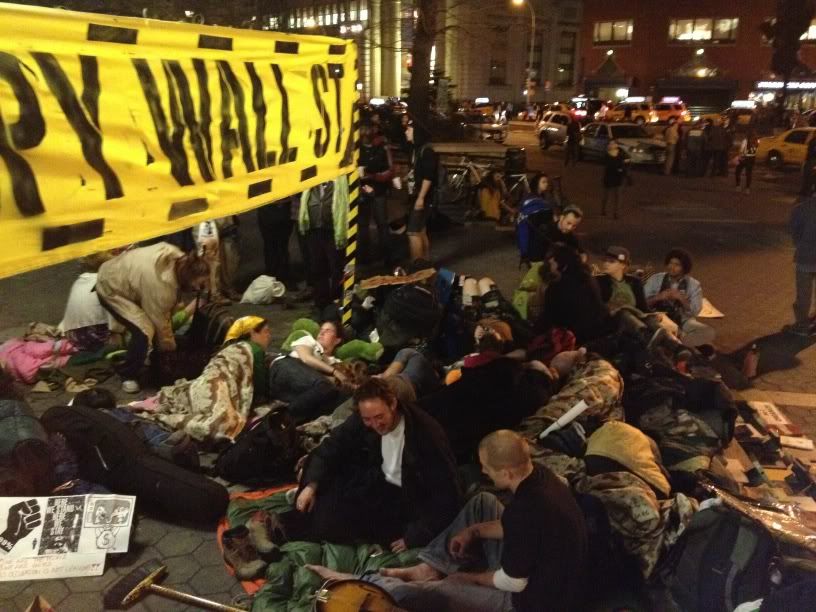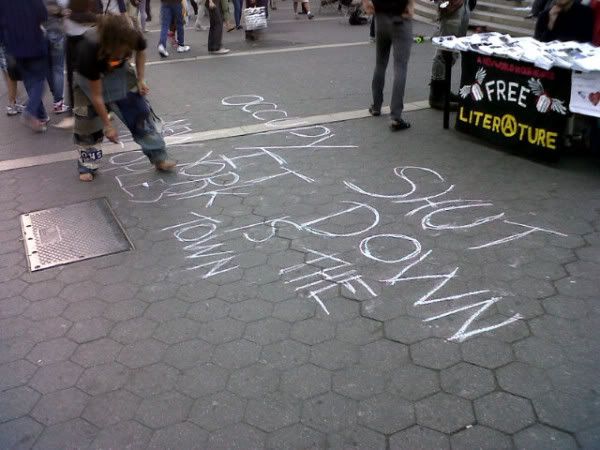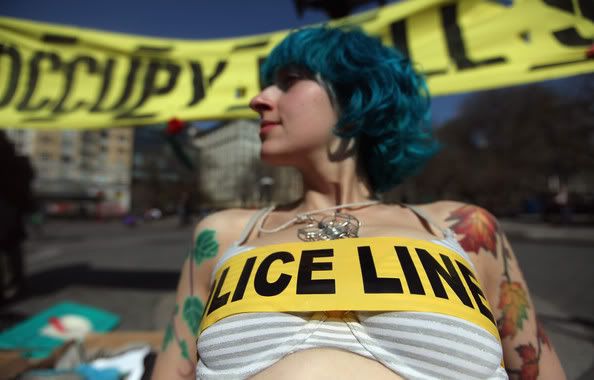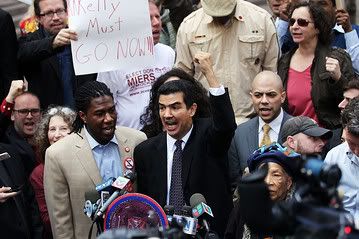
Quietly and with little fanfare, Occupiers have set up a second camp at Union Square. There aren’t any tents propped up yet, but some protesters did bring sleeping bags, indicating their intention to remain at the square indefinitely.
“We reached consensus today to try to make this a permanent occupation,” said Darah McJimsey, a 23-year-old activist who came to New York from California in November to join the Occupy movement full-time. “Although we’re aware of what we’re up against, we’re going to draw on our skills as far as being mobile.”
When I visited the second occupation over the weekend, there were only five Occupiers holding down the location, but as of this week that number has grown to some 25 protesters, many of whom sat shirtless in the sunshine. The cluster of protesters is easy to spot, gathered beneath the familiar yellow “OCCUPY WALL ST” banner at the top of the steps. (photo by @ASE)

The decision to occupy the square was made by 20 to 30 activists who travelled there after police brutally dispersed around 500 people from Zuccotti Park on Saturday, the Times reports. Occupy’s website now features a call to “Occupy Union Square,” and claims over 70 people are participating in the occupation.
“Although tents and tables are still banned, Occupiers have brought blankets and sleeping gear. Many are calling it, ‘The New Occupation,’” the website states.
“It’s experimental,” explained Ms. McJimsey to the Times. “The cops told us at 4 a.m. that ‘you need to sit up.’ They weren’t going to arrest us for laying down though, so it’s kind of unclear what we’re allowed to do and not allowed to do.”

Like the first occupation, this new protest inspired some eyerolling from naysayers when I informed them about it. “It won’t last,” and “The cops will break it up,” have become familiar refrains in reporting the public’s reaction to Occupy. The same statements were made in September when a couple dozen people started setting up tents in a small cement park called Zuccotti. (photo by @CarrieM123)
But even some Occupiers have their doubts about this new camp.
Steven Shryrock, 60, a computer graphics professional who held a cardboard sign reading “Ask us about Occupy Wall St,” was doubtful about whether the newly declared occupation would last. He said, “I don’t know how long we’re going to keep doing it right here, but if the police are going to be so nasty about Zuccotti from now on, it’s hard to say.”
The Post reported one protester, Daniel Jaffe, 33, has been arrested after he climbed onto the George Washington statue and refused to come down.
Protester Lauren Digioia wears police tape during an Occupy Wall Street protest in Union Square on March 19, 2012 in New York City (photo by Mario Tama/Getty)

“Our ability to occupy the commons in order to voice dissent is a vital political right,” the Occupy website states. “We do not need a permit to exist in public space. We call on all those who would stand for equality, justice, and liberation - and against the banks, corporations, wealthy elites, and corrupt politicians who have stolen our democracy and ruined our economy - to join us now.”
The statement closes: “Spring is coming. The time to get involved is now!”
 On Monday, two City Council members who have supported OWS since the beginning, Ydanis Rodriguez and Jumaane Williams, denounced what they characterize as police abuse of protesters during a press conference held at Zuccotti Park. (photo by Getty)
On Monday, two City Council members who have supported OWS since the beginning, Ydanis Rodriguez and Jumaane Williams, denounced what they characterize as police abuse of protesters during a press conference held at Zuccotti Park. (photo by Getty)
The protesters “are not terrorists, they are not enemies of the state,” said Williams. “This park is to be used by the public. Occupy Wall Street is part of the public.” He added: “What this is about — and let’s be clear — is suppression of dissent.”
The Wall Street Journal reports that the council members are in the process of writing legislation for a protesters’ bill of rights, which they plan to bring forth to City Council later this week.
One of the central concerns of protesters, and Rodriguez, is the Federal Restricted Grounds Improvement Act, recently signed by President Obama, which restricts access to public spaces when Secret Service officials are on the premises.
“There was a lot of excessive force used by the NYPD,” said Rodriguez. “We believe that a protesters’ bill of rights will send a clear definition of the responsibly of the NYPD.” The council member was arrested during an Occupy Wall Street-related protest on Nov. 17, 2011.
The new law re-writes an exiting 1971 trespass law, removing a single word that could have a huge impact on protesters. The original law states someone had to act “wilfully and knowingly” when committing the crime. Now, the language states that the actor only need behave “knowingly,” meaning a person could be charged simply for knowing they were in a restricted area, even if they are not committing a crime.
The timing of the new act is interesting given the recent relocation of the G8 to Camp David following plans for massive protests in Chicago, and statements from OWS protesters about surging during the spring and summer.




